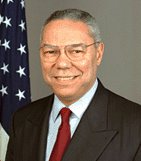Canada, Afghanistan and the Powell Doctrine
 When he was chairman of the Joint Chiefs of Staff, Colin Powell articulated a new doctrine to guide use of the U.S. military abroad. Fabricated from the wreckage of Vietnam, the doctrine insists certain criteria must be met before force is justified:
When he was chairman of the Joint Chiefs of Staff, Colin Powell articulated a new doctrine to guide use of the U.S. military abroad. Fabricated from the wreckage of Vietnam, the doctrine insists certain criteria must be met before force is justified:- A vital national security interest must be threatened.
- There must be a clear and attainable goal.
- The risks and costs must be thoroughly and honestly analyzed.
- All non-violent means must be fully exhausted.
- There must be a plausible exit strategy.
- The consequences of the operation must be fully considered.
- The operation must be supported by the public.
- The operation must have broad international support.
When we ponder our current involvement in Afghanistan, we could do worse than consider the Powell Doctrine. A recent survey sends a clear message that a key criterion, the support of the public, is lacking. Just as we significantly increase our involvement, only a quarter of Canadians support sending troops, a position undoubtedly influenced by the chaos in Iraq. And what about the other criteria? We may wish to pursue more altruistic ends than just defending our national security, but do we at least have a clear goal? Are we participating in the Bush Administration's ludicrous "war" on terror, or are we attempting to help the Afghans stabilize and rebuild their country? Are we confident we have the resources to achieve this goal? Do we have an exit strategy if it becomes apparent the mission is failing? And how do we decide if it's failing? The Canadian people, deeply apprehensive about our commitment, deserve answers to all these questions.
Defence Minister Gordon O'Connor admits he has a big selling job in convincing us our troops should be there. This is why he should do what three-quarters of Canadians are asking him to do: obtain parliamentary approval. Canadians want a thorough debate in the House. Unfortunately, Mr. O'Connor does not.
He thereby runs the risk of having us slip unconsciously into a morass, just as the Americans did in Vietnam.



















